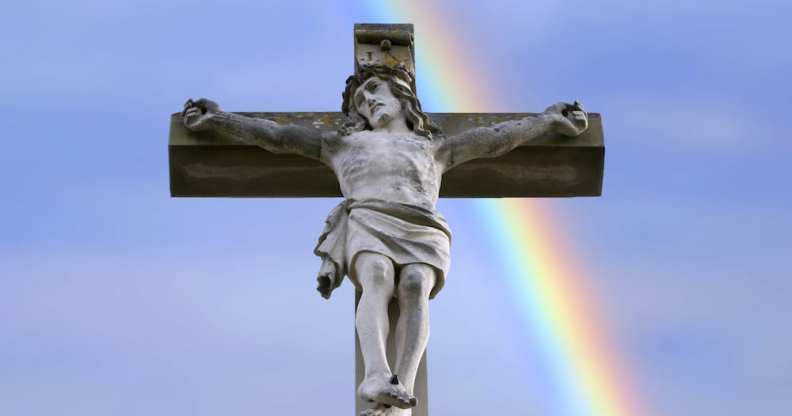Majority of LGBT+ Christians don’t feel safe to be themselves in church, damning report finds

Jesus challenged conservative interpretations of scripture during his life. (Getty)
A worrying report has shown that just a third of LGBT+ Christians feel safe to be themselves at church, fearing “hostility and discrimination”.
The report from the Ozanne Foundation, in collaboration with eight LGBT+ Christian organisations, is the result of research conducted last year and overseen by Dr Sarah Carr, a mental health and social care research specialist.
The survey received around 750 responses from queer Christian adults in the UK, with the majority (59 per cent) attending Church of England churches, and the remaining respondents belonging to other Christian denominations.
It found that less than a third (31 per cent) of LGBT+ Christians felt they could “be themselves” at church, with gay men the most likely to “feel safe to be out to everyone in their local church” (45 per cent).
This figure dropped significantly for lesbians (35 per cent), even further for trans and non-binary folk (28 per cent), and just 23 per cent of bisexual Christians said they felt safe to be out at church.
Most respondents felt that while their physical safety was prioritised by church leaders, far less attention was given to their “spiritual”, “sexual”, “psychological” and “emotional” safety.
Dr Carr said: “The findings show that fear and anticipation as well as experiences of hostility and discrimination can make churches feel unsafe, exclusionary environments where many LGBT+ people state they ‘feel scared to be themselves’.
“While there was a recognition that churches focused on physical aspects of safeguarding, attention to emotional and psychological safeguarding was found wanting – which the findings imply are just the type of safeguarding LGBT+ Christians need!”
Key to improving things for #LGBT+ #Christians the 2021 LGBT Christian Safeguarding Survey report shows that churches need to broaden their concept of Safeguarding from focusing on just church goers' 'physical' safety to including 'emotional', 'spiritual' & 'mental health' safety pic.twitter.com/BNVT2ULk6L
— Ozanne Foundation (@OzanneFoundn) January 31, 2022
Asked what being safe at church looked like, three quarters of LGBT+ Christians described it as not being “worried what might be said in the sermon” and being able to be “open with the clergy about my sexuality and/or gender identity”.
The role of clergy in safeguarding LGBT+ Christians was clear, with others saying that church leaders “openly affirming same-sex relationships”, having an “inclusive statement on our church website” and having “positive recognition of LGBT+ people in sermons” would make them feel safer.
The right reverend Paul Bayes, Bishop of Liverpool and former chair of the Ozanne Foundation, said the research “shows just how important it is for church leaders to be clear about where they stand on LGBT+ matters”.
“Silence has a price – and we now see clearly who has been paying it,” he added.
“I long for the day when all LGBT+ people can enter a church and not feel apprehensive or anxious about how they might be treated.”
Dave Moreton of Oasis Open House, an organisation supporting LGBT+ people of faith, described the worrying findings laid out in the report as “the outcome of faith-based rejection and conversion therapy“.
Moreton said: “Safeguarding is one of the most challenging topics before the Church today, especially as many of our LGBT+ siblings tragically harm themselves, leave the church and even take their own lives.
“It is a shame that many of our LGBT+ siblings feel safer in a gay bar than in one of our church congregations.”
The report included recommendations for church leaders, and stated that churches need “to be far more proactive in helping LGBT+ Christians feel safe enough to be themselves”, “to broaden their concept of safety to include matters that impact the emotional and mental health of their members” and “to be clear where they stand on LGBT+ matters”. Wider faith communities must also “drive awareness of pressures faced by LGBT+ Christians”.
Jayne Ozanne, director of the Ozanne Foundation, said: “This research shows just how vulnerable LGBT+ Christians feel in our churches.
“The fact that so many are apprehensive about attending church and are worried about what might be said in the sermon should come as a serious wake-up call to church leaders.
“It’s time we took the wellbeing of LGBT+ people in our care seriously and look at ways in which we can help them feel safe.”

